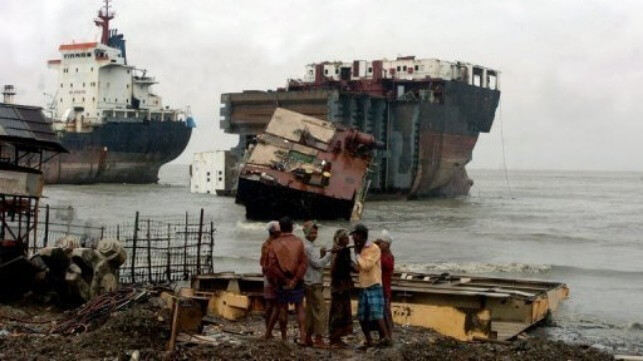NGO Highlights Continuing Problems in Ship Recycling in 2023

NGO Shipbreaking Platform is out with its annual report on the shipbreaking industry remaining highly critical of the industry for its continued reliance on the Southeast Asian yards which they contend have the lowest safety and environmental records. According to its analysts, 85 percent of the world’s ships sold for scrap in 2023 went to Bangladesh, India, or Pakistan, despite the regulations that require environmentally sound recycling.
While the overall rate of scrapping of ships has been down in the past few years and remained relatively flat year-over-year in 2023, the group highlights that the shipping industry is still avoiding regulations and finding ways to dispose of its ships without concern for safety and the environment. They repeated their calls for the EU and others to become more aggressive in their enforcement efforts.
"There is no possibility to take apart a ship on a beach in a way that is environmentally sustainable and safe for workers,” says Ingvild Jenssen - Executive Director and Founder of NGO Shipbreaking Platform. “Shipping companies are dodging their responsibility to make sure their toxic waste does not harm workers’ health and sensitive coastal environments."
According to the NGO’s calculations, a total of 446 ocean-going ships and offshore platforms were scrapped in 2023. The vast majority, a total of 325, went to the three countries, with Bangladesh representing the largest amount with 170 vessels. India was a close second with 140 vessels. Turkey by comparison the NGO says received just 44 vessels while 49 vessels went to other parts of the world.
China, they calculate was the largest exporter of vessels for recycling in 2023, despite the presence of state-of-the-art recycling facilities in country. They cite other countries including Hong Kong, the UAE, Thailand, Greece, Russia, and South Korea, as also sending ships to the beaches in Bangladesh and India. Pakistan’s count fell to just 15 ships due to economic and political reasons but continues to be cited by the group because of its poor safety record.
“Environmental and labor laws that regulate ship recycling exist, but they are ignored and easily circumvented by shipowners,” writes NGO Shipbreaking in its annual report. They contend that audits for example in Turkey have shown that day-to-day practices do not comply with the standards required for EU approval. They contend that toxic waste regularly leaks into the water and that air pollution is far above international standards. Dangers range from explosions to falling steel plates, and toxic fumes.
Emphasizing the dangers, they calculate that at least six workers were killed in Chattogram, Bangladesh in 2023. Another 19 they reported were severely injured. Due to lax enforcement, they believe many accidents at the yards go unreported.
The group also contends that many of the leading shipowners in the world and especially in Europe still are sending vessels to the beaches in the three countries. They acknowledge that a lot of vessels go through cash buyers as the middlemen.
They cite the continued use of cash buyers, calling attention to the fact that “Almost half of the ships beached in 2023 changed their original flag to a grey- or black-listed flag registry just weeks before hitting the beach. The flags of Cameroon, Comoros, Mongolia, Palau, St Kitts & Nevis, and Tanzania were particularly popular with cash buyers.”

that matters most
Get the latest maritime news delivered to your inbox daily.
NGO Shipbuilding specifically cites MSC Mediterranean Shipping Company contending the world’s largest container carrier has sent more than 100 ships for scrapping in the past decade. They report that MSC scrapped 14 of its oldest containerships in Alang, India in 2023. The group calls for MSC, which they highlighted banned the transport of illegal, toxic waste on its ships to illegal facilities to make the same commitment for its own fleet and stop sending ships to the beaches in the three leading countries.
They highlight that the number of vessels that will be dismantled is expected to surge in the coming years. They are calling on the EU as it reviews its legislation to include ownership and not just flags to increase the accountability for safe and environmentally sound ship recycling.
